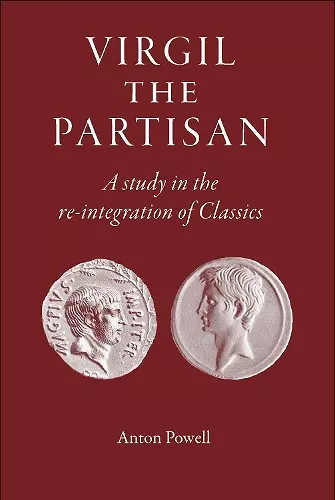Virgil the Partisan
A Study in the Re-integration of Classics
Format:Paperback
Publisher:Classical Press of Wales
Published:22nd Feb '13
Currently unavailable, our supplier has not provided us a restock date

Since its first appearance in 2008, this book has changed the landscape of Virgilian studies. Analysing closely the logic and the literary genres of Virgil's three poems, it politely confronts the modern orthodoxy that Virgil signalled distaste for the methods of his ruler, Octavian-Augustus. It refreshes the study of Virgil's poetry by comparing it with the detail (normally neglected by scholars) of Rome's civil wars after Julius Caesar's death, when Octavian's survival looked highly unlikely. And it argues that Virgil wrote as a passionate - and brave - partisan of Octavian, who - like a good lawyer - confronted his patron's undeniable failings in order to defend. Awarded in 2011 the prize of the Vergilian Society for 'the book that makes the greatest contribution toward our understanding and appreciation of Virgil'.
Toward the end of this book, Powell (Univ. of Wales) sums up his approach as proceeding from ideals expressed to realities suffered.' A striking example of this is the chapter titled 'The Theft of Pietas,' in which the author argues that Virgil, unable to credit Octavian with pietas, creates the image of a pius ancestor, Aeneas, the incarnation of this virtue, which would then be transferred by association to Octavian. Powell himself is much more partial toward Sextus Pompeius--witness Sextus Pompeius, which he edited with Kathryn Welch (2002)--a fierce opponent of Octavian who styled himself Magnus Pius. One of Powells objectives here is to shift the focus of Virgilian studies from individual works to the whole oeuvre and to see one intention in all of them, to defend the cause of Octavian-Augustus. Although he accepts the premises behind analyses of Virgils works based on genre and architecture, Powell sees an overarching political structure. In elaborating this thesis he makes good use of neglected ancient historians of the period--Suetonius, Appian, Dio Cassius. His countercurrent argument is bound to stir up much controversy among traditional Virgilian scholars, which is all to the good. An absorbing read. Summing Up: Highly recommended. Upper-division undergraduate through faculty. -- C. Fantazzi, East Carolina University Choice September 2008 Powell is not afraid to use modern parallels that, among other things, demonstrate clearly to a contemporary audience how knowledge of the timing of an event can inform our understanding of it and of a writers' reasons to include or exclude it. He writes in a lucid and attractive style, displaying his admiration for Virgil on every page...' -- D.E. Hill Greece and Rome 2009 Radicalises the study of politics in Augustan poetry...A book rich in arguments which opens new fields to explore.' -- Frank Wittchow Gymnasium This stimulating volume seeks to put the party politics back into Virgils oeuvre...Powell rightly concludes that the success of the Augustan project has concealed the partisan and prophetic aspect of Virgils political stance...' -- Stephen Harrison Mnemosyne '...the contribution of this book lies above all in the compelling argument that the political and military history of the 30s BC is more important for an understanding of all three of Virgil's major works than it is often taken to be... Powell's Virgil is unashamedly pro-Octavian, pro-Augustus... This is not a fashionable approach to Virgil, and doubtless many will resist Powell's political reading. But it will be impossible in future to ignore Powell's careful and detailed arguments for the centrality of the historical context...' -- Philip Hardie and Julia Dyson Hejduk Vergilian Society Prize Committee citation 'Powell's analysis is acute and his reading is coherent and cogent. This is a book full of interest and surprises on virtually every page...' -- John Godwin Journal of Classics Teaching
ISBN: 9781905125548
Dimensions: unknown
Weight: 690g
310 pages